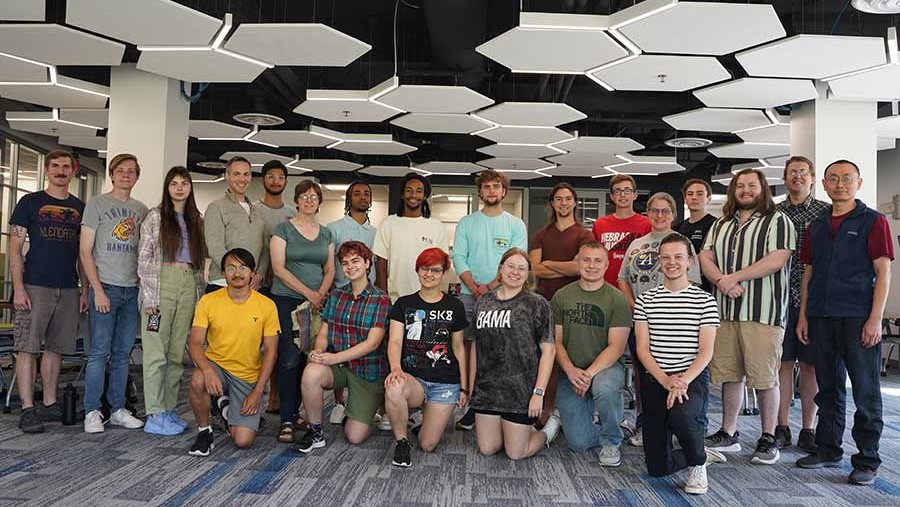South Dakota Mines Hosts Leading Astroparticle Physicists and Students at IceCube Undergraduate Summer Program

This piece by South Dakota Mines was published June 27.
Photo: A group of astroparticle physicists and physics students have gathered at South Dakota Mines this summer for the third annual IceCube EPSCoR Initiative (or IEI) Undergraduate Summer Program.
A group of leading astroparticle physics researchers and physics students from across the nation have gathered at South Dakota Mines for the third annual IceCube EPSCoR Initiative (IEI) Undergraduate Summer Program sponsored by the National Science Foundation.
The IceCube Neutrino Observatory, located at the geographic South Pole, is the world’s largest facility of its type. It includes a cubic kilometer array of over 5,000 optical sensors that have been placed up to two kilometers deep in the glacial ice. In a nutshell, the observatory turns a gigaton of high-purity South Pole ice into an astroparticle detector.
The program brings together 11 of the top particle astrophysicists from around the nation and 20 highly motivated college students from seven EPSCoR jurisdictions who are learning or working with IceCube and assisting in preparation for IceCube Generation-2 (or Gen2) experiment.
Students are spending seven weeks in June and July delving into the mysteries at the frontiers of multimessenger astronomy and astroparticle physics while learning the techniques used to perform analyses of the huge dataset generated by IceCube. The experiment yields about one terabyte of raw data per day.
“Thanks to this summer program, this cohort of physics researchers will be well-positioned to make seminal contributions to IceCube in the upcoming academic year, and beyond,” says Xinhua Bai, Ph.D., a professor of physics at Mines and one of the eleven faculty members taking part in the IEI Undergraduate Summer Program.
For most students in the program, it is their first time in South Dakota. They will pay a visit to the Sanford Underground Research Facility (SURF) to explore the incredible research underway in the state. They will also take part in a social gathering at Mt. Rushmore during the 4th of July holiday break. “This is a group of talented students with fantastic dreams and huge potential. During this summer program we want to share our love of physics with them, and we also want to share opportunities in the beautiful and friendly Black Hills,” Bai added.
The list of faculty members presenting during the summer program includes; Dawn Williams, Ph.D., form the University of Alabama; Katherine Rawlins, Ph.D., from the University of Alaska Anchorage; David Besson, Ph.D., from the University of Kansas; Matthias Plum, Ph.D., from South Dakota Mines; Frank Schroeder, Ph.D., from the University of Delaware; Ilya Kravchenko, Ph.D., from the University of Nebraska-Lincoln; David Seckel, Ph.D., from the University of Delaware; Marcos Santander, Ph.D., from the University of Alabama; Spencer Axani, Ph.D., from the University of Delaware; Ali Fazely, Ph.D., from Southern University and A&M College and Xinhua Bai, Ph.D., from South Dakota Mines.
“Dr. Matthias Plum and I want to express our gratitude for all those on campus and around the community who have assisted with organizing and hosting this summer program,” says Bai. “Mines physics research scientist Larissa Paul, graduate students Logan Molchany, Amar Thakuri and Alexis Hanson have been excellent to assist in student training during this program. On the Mines campus Lisa Carlson, Stephanie Lindsley, Travis Kowalski, along with our campus Information and Technology Services, our Department of Physics, and others have been instrumental in their support. We also want to thank Deb Wolf, Chad Ronish, and all those at SURF for their help and support of this effort.”
This interview on South Dakota Public Broadcasting includes two of the leading astroparticle physicists who are taking part in the summer program.
 National Science Foundation RII Track-1 Project:Expanding Research, Education and Innovation in South Dakota
National Science Foundation RII Track-1 Project:Expanding Research, Education and Innovation in South Dakota